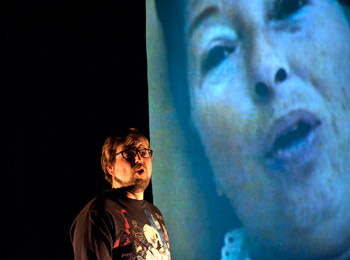TORONTO — In 1999, Itai Erdal packed his bags in Jerusalem and got on a plane to Vancouver to study at the Vancouver Film School. About a year later, he received a phone call from Israel telling him that his mother, Mery, had been diagnosed with lung cancer and had only nine months to live.
Erdal immediately boarded a plane back home to be with her. Ever the documentary filmmaker, he brought along a camera to record the final months of his mother’s life – something his mother strongly encouraged. She considered it a way to contribute to her son’s future career, Erdal said. She even offered guidance on how to get better shots and which angles to film from.
“My mom was a very unique woman, and her approach to her death was unique,” said Erdal, now 37, adding that his mother faced her death with great strength and, with her robust sense of humour and joie de vivre, she continued to be the family’s support system. “She was sort of like a rock and everyone was falling apart around her,” he said.
After his mother died at the age of 57, nine months after her diagnosis, Erdal returned to Vancouver. He had planned to create a film about his mother, but when he sat down with the footage he had collected, things did not quite go as planned.
“It was way too painful and close and too soon,” he said of his first attempt at putting together the film. Erdal decided to put the project aside for a while, until he felt able to return to it.
In the meantime, film work in Vancouver was disappearing, and Erdal found himself working in theatre lighting design, something he had experience with from his work in Israel. As the years passed by, he became a renowned lighting designer, working on productions in Europe, North America and Israel.
Eventually, about six years ago, Erdal got the opportunity he had been waiting for to return to the footage he had of his mother. A friend of his named James Long asked to show some of the recordings as part of a workshop he was conducting on short performance pieces.
Erdal agreed to show the footage and to speak to the workshop’s participants about his experience with his mother at the end of her life. He stood in front of the small crowd and translated from Hebrew, adding his own commentary as the images flickered across the screen.
It was then and there that the first seeds of what would become Erdal’s most personal and important work were sown. After about five years of writing, editing and hard work together with Long, who became the show’s director, Erdal finished the script for How to Disappear Completely, a one-man show documenting the end of his mother’s life.
How to Disappear Completely, which was produced by Vancouver’s The Chop Theatre and debuted at the 2011 Chutzpah! Festival, features Erdal on stage with a projection of his footage above him. The show is expertly lit by Erdal himself, and, in it, he interacts with his mother’s filmed image and tells the audience about her.
“This show is the most important thing I’ve done in my life,” said Erdal, who just completed a run of performances at Toronto’s Factory Theatre. He explained that the show allows him to continue spending time with his mother even 12 years after her death, and to show others what an exceptional person she was.
“I think my show forces people to feel things,” said Erdal, adding that at the end of each performance, he has audience members lining up to speak with him about their own experiences with grief and about how his show has helped them. “Now my experiences can touch other people, and that’s really the most beautiful thing about theatre,” he said.
Erdal will be taking How to Disappear Completely to Seattle next year and has plans to continue touring it as much as he can.
For more information about Erdal, visit www.itaierdal.com.
